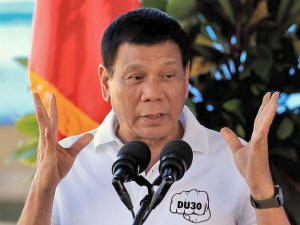|
Duterte says felt rapport with Trump,
assures
 Send a link to a friend
Send a link to a friend
 [December 03, 2016]
By Martin Petty and David Brunnstrom [December 03, 2016]
By Martin Petty and David Brunnstrom
MANILA/WASHINGTON (Reuters) - Philippines
leader Rodrigo Duterte described as "encouraging" his phone call with
U.S. President-elect Donald Trump on Friday, during which he felt a
rapport between them and gave assurance that ties were intact, despite a
period of rocky relations.
Trump's seven-minute chat with the firebrand Philippine president
follows months of uncertainty about one of Washington's most important
Asian alliances, stoked by Duterte's hostility towards President Barack
Obama and repeated threats to sever decades-old defense ties.
Duterte's anger was unleashed following Obama's concerns about possible
human rights abuses in his war on drugs, during which more than 2,000
people have been killed.
Duterte said Trump was "sensitive" and understanding about his crackdown
and was encouraged by what he interpreted as Trump's indication he would
not interfere.
"I could sense a good rapport, an animated President-elect Trump. And he
was wishing me success in my campaign against the drug problem," Duterte
said in comments his office released on Saturday.
"He understood the way we are handling it ... I supposed that what he
really wanted to say was that we would be the last to interfere in the
affairs of your own country."
He added: "We are doing it as a sovereign nation, the right way. And he
wishes us well. And I said that, well, we assured him of our ties with
America."

His special adviser, Christopher Go, had earlier said in a text message
to media that Trump had invited Duterte to visit the White House next
year.
There appeared to be confusion, however. Duterte mentioned an invite to
Washington and New York, and that Trump asked him to notify him of his
presence "if I'm around".
A statement issued by Trump's transition team made no mention of that.
It said the two men "noted the long history of friendship" between their
countries and would work closely on "matters of shared interest and
concern".
Duterte made waves when he visited China in October and announced his
"separation" from the United States.
In five months in office, he has upended Philippine foreign policy by
berating the United States, pursuing a new alliance with Russia and also
China, with which Manila has a history of bitter disputes.
His diplomacy has created jitters among Asian nations concerned about
Beijing's influence and Washington's regional staying power.
Duterte told Democrat Obama to "go to hell" and called him a "son of a
bitch" whom he would humiliate if he visited the Philippines.
Despite his optimism about Trump's win, it has not stopped Duterte
railing against what he calls a U.S. history of "hypocrisy" and
"bullying" worldwide.
Republican Trump told Reuters during his campaign that Duterte's
comments about Obama had showed "a lack of respect for our country." But
he also stressed the "very important strategic location" of the
Philippines.

[to top of second column] |

Philippine President Rodrigo Duterte gestures while delivering a
speech during the inauguration of a drug abuse treatment and
rehabilitation center inside the military headquarters in Fort
Magsaysay, in the Nueva Ecija province, north of Manila, Philippines
November 29, 2016.

'CLEAN SLATE'
A source who has advised Trump's transition team on security policy
said the president-elect would start a "clean slate" with Duterte.
"He is perfectly capable of talking to Duterte in an open way
without being wedded to previous policy failures," the source said
of Trump.
Sometimes called the 'Trump of the East' because of his brash,
mercurial style, Duterte has threatened repeatedly to scrap U.S.
defense ties, saying he "hates" having foreign soldiers in the
Philippines.
Joint military exercises look set to be downsized as Duterte
demanded and uncertainty surrounds the 2014 Enhanced Defence
Cooperation Agreement (EDCA), a deal of strategic importance because
it allows U.S. access to Philippine bases on a troop rotation basis.
"EDCA is a concern and some of the things Duterte has said are a
concern," said the advisor to Trump's team. "That is not going to
change based on who the president is."
Some experts say Duterte's appointment of special envoys to
Washington suggest he aims to keep good ties. Among those is real
estate tycoon Jose Antonio, who bought the rights to name a new
commercial project in Manila "Trump Towers".
Ernest Bower of the Bower Group Asia consultancy said it was likely
the call was set up by Trump's Philippine business partners and a
core group of advisers, including his children.
Bower said Trump's win could offer Duterte a face-saving way to step
back from his anti-U.S. stance, while Duterte offers Trump a chance
to stress the importance of Asian alliances.
Duterte said it would be "great for our country" if Trump visited
Manila next year when it chairs the Association of South East Asian
Nations and summits of Asian leaders, and Trump wanted to attend.
Bower said that may have been fortuitous for Trump.

"My guess is he was more interested in making a point - that he
could deal with Duterte in ways Obama couldn't - than in the
strategic wisdom of driving alignment with the ASEAN chair."
(Addtional reporting by Manuel Mogato in Manila and Steve Holland
and Yeganeh Torbati in Washington; Writing by Martin Petty; Editing
by Richard Pullin)
[© 2016 Thomson Reuters. All rights
reserved.]
Copyright 2016 Reuters. All rights reserved. This material may not be published,
broadcast, rewritten or redistributed. |